Backcountry Lifeline – Wilderness First Aid for Mountain Bikers
(Last Updated On: )
In August 2015 the Big Mountain Enduro Series and Enduro World Series converged for a second year in a row upon Crested Butte. The talented riders took the trails by storm once again. But as favored rider Will Olsen descended Trail 400 for the Stage 3 course, tragedy struck. As a result, the community lost a friend, fiance, and rising star.
In Will’s case, and with several other similar instances, the first people on the scene were other athletes. If you came upon this type of situation, would YOU know what to do?
After years of both skiing and mountain biking in the backcountry, Frank and I can without a doubt say that we have encountered far more accident scenes on our mountain bikes than on skis. You would think that with the added risk of avalanches, that events like this would be more common with backcountry skiing. But, in our case, we have come upon or been involved with many more severe injuries on our bikes than on skis.
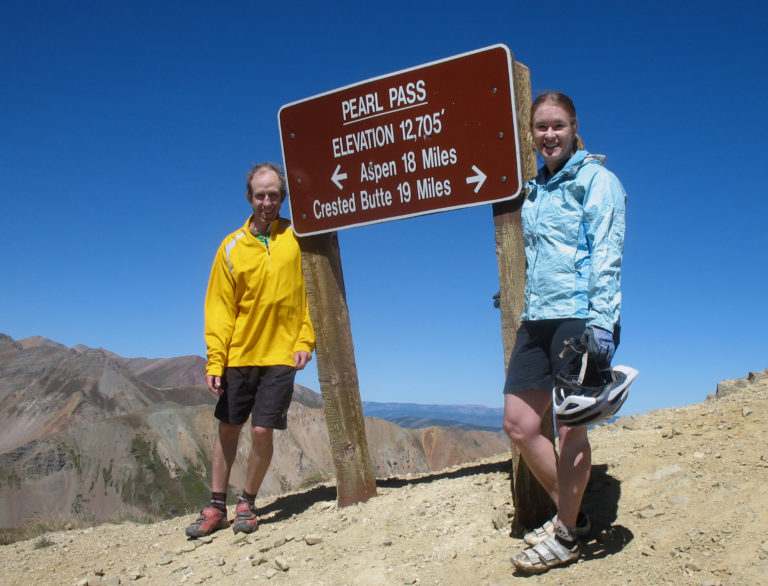
Even just last fall I was riding in Fruita with my friend Natalie and came upon a woman with her 12 year old son. She had fallen and taken an impact of the end of a handlebar into her abdomen. It took us an hour and a half to get her roughly a mile back to the parking lot. And we were lucky here, as we weren’t really actually in the backcountry.
For some reason, many people feel that mountain biking is a relatively safe activity, especially compared to backcountry skiing. And perhaps it is. But, accidents on mountain bikes happen. A lot. And the injuries can be a lot more serious than people realize sometimes. When you are miles deep in the backcountry in a place where cell phones won’t work, will you know what to do to help a fallen friend and riders?
That’s where Backcountry Lifeline comes in – first aid for mountain bikers, by mountain bikers.
These last couple of months, I caught up with Bonnie McDonald and Flynn George, two of the founders of Backcountry Lifeline to get their story. Here’s what they shared.
1) Backcountry Life Line was inspired by the passing of Will Olson in 2015. Describe how you developed the concept for BCLL from that tragedy as well as others.
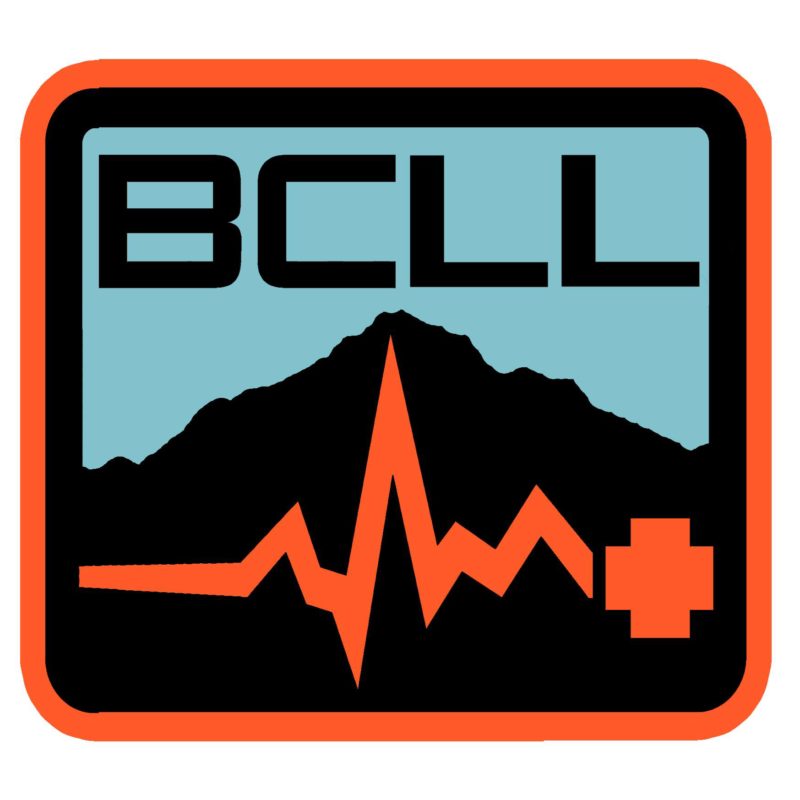 Will’s death was hugely impactful to all of us, in different ways. Flynn and Heidi were at the race: Flynn was one of the riders who tried to help with resuscitation efforts, while Heidi ended up with a race radio in hand. On the other side of the country, at my mother’s house, I was waiting for Will to call me after the race, as he said he would when we spoke that morning.
Will’s death was hugely impactful to all of us, in different ways. Flynn and Heidi were at the race: Flynn was one of the riders who tried to help with resuscitation efforts, while Heidi ended up with a race radio in hand. On the other side of the country, at my mother’s house, I was waiting for Will to call me after the race, as he said he would when we spoke that morning.
The idea of starting BCLL was shaped by slightly different experiences for each of us – by being on scene for Flynn, by hearing what was happening behind the scenes for Heidi, and by being on the receiving end of it all for me.
Personally, I wanted to start BCLL not because a different response would have yielded a different outcome for Will, but because my heart really broke for the riders and event organizers who were there… They were devastated that a fellow rider died in front of them; they felt helpless. If what we teach someday saves a life (and an appropriate and timely response to an accident certainly CAN make that difference), I will be ecstatic – but for me, that is almost secondary. More important to me, is that I want people to FEEL prepared – to feel confident in their response, and know that they did everything they could and had all that they needed to try to help.
Since starting BCLL, my thoughts on this have actually evolved to a much a stronger stance. No longer is it, “Here – let me be nice and do this service for you and help you be prepared so you won’t feel sad if your friend gets hurt in front of you…” Now it’s, “This is your responsibility. Period.”
You’d be an ass (and publicly shamed), if you went out backcountry skiing without a beacon, shovel, probe, skins that work, etc. It puts everyone in danger. The same should be true with mountain biking. If you’re going out on the trails with your friends, you have an obligation – to both them and yourself – to be prepared: to have the right equipment, in good working order; to know trail etiquette and be a good steward; and to know what to do in the event you, your friend, or another rider has a crash. We are all we’ve got out there. Anything less is irresponsible.
How it started….
Heidi and Flynn, along with another rider, EMT Matt Hightower, started talking about starting some sort effort following the incident. The were going to call it “The Will Power Initiative,” and began drafting some plans for it.
In the weeks following the accident, Will’s dad, Gary, and I, had started having a similar conversation. There was some money left over from a “Go Fund Me” campaign that one of the riders had graciously started to help us with expenses, and we wanted to put it good use – in a way that would support the sport that Will loved so much.
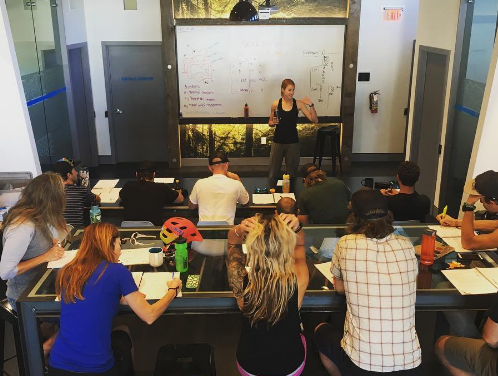
As Heidi, Flynn and I continued to talk, we learned that Will was only one of a number of deaths/serious injuries that occurred that summer. It felt like it was the right time – and there was a real need – to bring conversation and awareness about safety, accidents, and emergency preparedness to the forefront of the mountain bike community. It seemed like as a community/industry, we were behind other sports in this regard (for example, backcountry skiing), where the appropriate training and tools are barriers of entry – the minimum requirements – needed, in order to play.
This is how and why Backcountry Lifeline was born. We launched our website in Feb 2015, and held our first training two months later.
2) Tell us more about your course offerings.
We offer two basic courses: our single-day First Aid for Mountain BikersTM course, and our three-day Wilderness First Aid for Mountain BikersTM camp. Other times, we might provide free basic CPR training at events, and/or provide consultation on medical coverage or incident action plans.
While our schedule continues to evolve, here are some of the courses and events we will be hosting/attending:
- Wilderness First Aid camp w/Big Mountain Enduro, Curt Gowdy State Park WY, April 21-23
- Wilderness First Aid camp w/ Trailhead Athletics, Bellingham WA, May 5-7
- First Aid for Mountain Bikers w/the Sacred Cycle, Carbondale CO, May 20
- Big Mountain Enduro race, Santa Fe NM, May 27
- First Aid for Mountain Bikers w/NICA, Georgia, June 3-4
- Wilderness First Aid camp, Salem OR, June 9-11
- First Aid for Mountain Bikers w/Yeti Cycles, June 20
- First Aid for Mountain Bikers w/Vail Rec District, June 21
- Big Mountain Enduro race, Keystone, June 24
- First Aid for Mountain Bikers w/Crested Butte Devo Team, Crested Butte CO, July 1-2
- Big Mountain Enduro race, Winter Park, July 8
- Yeti Tribe Gathering, Crested Butte CO, July 21-23
- Big Mountain Enduro/EWS race, Aspen Snowmass, July 29-30
- Breck Epic, Breckenridge CO, Aug 14-18
- Big Mountain Enduro, Crested Butte CO, Aug 19-20
- TBD: Date to train Yeti staff
3) Do you typically do courses only at events? If a group wanted to hire you privately, could they? Are all your offerings in Colorado?
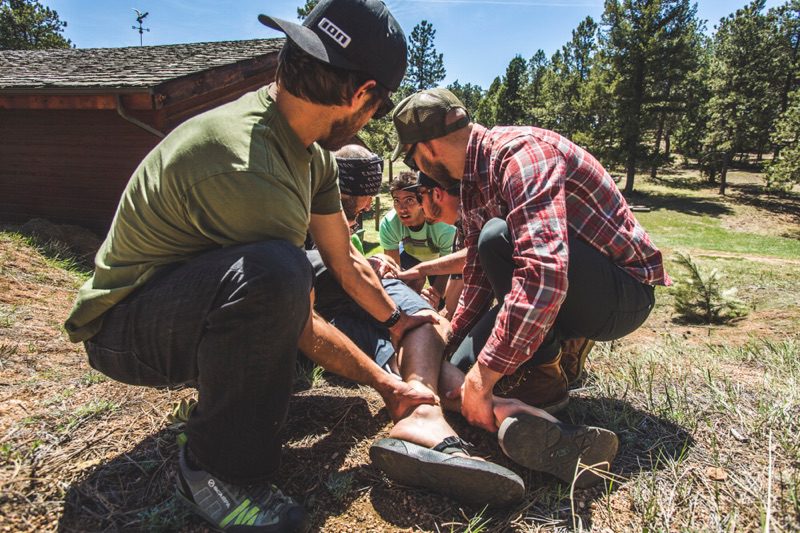
This year, we are doing this less, opting instead to host courses independently from events. Sometimes, we host trainings ourselves – but then it’s sort of hit or miss if that date works out well for enough people, despite the demand for trainings. We had to cancel a course due to low registration once.
More often now though, people come to us, requesting a training for their group. THEY fill the course – we just show up and teach. This seems to be the most effective in getting the trainings to committed, engaged riders. These courses always fill, and even have waiting lists.
So far for 2017, we have had/will have trainings in Wyoming, Georgia, Washington, and Oregon, in addition to Colorado.
4) Are there other organizations that you know of similar to yours offering courses like yours in other parts of the country? If someone is interested in creating a branch of your organization in a different area, could they contact you?
There are certainly groups hosting CPR, First Aid and Wilderness First Aid trainings throughout the world. What sets ours apart is that it is taught for mountain bikers, by mountain bikers. We keep the information super relevant to mountain biking and the types of accidents/injuries we’re likely to see, teach people what to carry, and train folks how to use what they already have on them.
We’ve received a lot of interest from folks looking to join our team, or bring our program to other parts of the country. We love this! We are currently working on a training program for BCLL instructors, and hope to have that launched for 2018. If anyone is interested, please reach out–we’re collecting names!
5) How many people have taken each of your different course offerings?
At the time of this interview, BCLL has trained about 300 riders–50 of these attended our Wilderness First Aid for Mountain Bikers camp, while about 250 took our one-day course focusing on basic First Aid and CPR for Mountain Bikers. Additionally, we have taught many others CPR only at events. At these events, we bring our mannequins with us, and invite people to stop by to learn the basics for free.
6) What roles do each of you play in the life of BCLL? How many people work/volunteer for your organization?
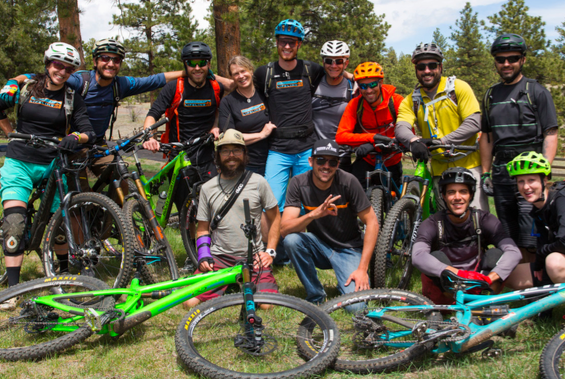
7) What fundraising events, if any, do you have coming up?
We’ll be doing TWO Giveaways this year! We did one last year, and it was a huge success. Prizing will include products from Maxxis, Specialized, Smith, Shimano, Yeti, Osprey and Muc-Off. Folks definitely won’t want to miss it – there are TWO bikes for the taking this year!
The Raffles will take place in July and September. We’ll be launching the events and all the details soon. Participants can donate for tickets online, and do not need to be present to win. Information will be posted on our website, as well as our Facebook page. Interested people can also get raffle info in their inbox by signing up for our newsletter, which is found at the bottom of our website.
8) How has Backcountry Lifeline been received by the industry and mountain bike community?”
In all honesty, the response has been sensational.
We didn’t have to ask twice for industry leaders to support us. Everyone heard about Will’s crash, happening in a “world series” race, on a global platform, as it did. The incident rocked the entire industry, and caused a lot of people to give things a second thought. The industry folks we spoke with all said the same thing – “We need this, it’s the right thing to do, it’s time.”
The first companies to come to our aid were Maxxis, Specialized, Yeti, Smith and Shimano. They supported us financially, as well as with product, which we are able to use as incentives and giveaways. The first time one of these companies said they would support us, I started crying. It was so validating.
We were thrilled that all of our founding sponsors returned this year, most of whom stepped up their support significantly. We also picked up Osprey and Muc-Off this year. We honestly couldn’t do what we’re doing without these groups’ support, and their enthusiasm is sensational.
These companies are making pretty big statements. They’re not just in [mountain biking] for the money; they care about the sport, and they care about the community. They’re willing to “put their money where their mouth is,” so to speak. I think it’s incredible. And they’re not just supporting us in word (or dollars, rather), but in deed… This year, at their request, we will be training many of our sponsors’ corporate teams. They’re practicing what they preach, and leading by example. It’s exactly what we hoped for.
The community of mountain bike riders has certainly rallied behind this too. We receive requests daily for trainings, to join our team, for advice and support… We hear from riders, coaches, bike patrol, industry staff, and event directors from across the U.S. and from other countries. It’s sensational.
As a team, we’re incredibly grateful. In founding BCLL, our goal was–and continues to be–to make a positive difference in the mountain bike community. I believe that we have already been successful in planting the seed that we wanted to… Just bringing the conversation – a mindfulness towards emergency preparedness – to the forefront of mountain biking. It may take some time for it to really become fully ingrained and completely adopted, but it’s a super strong start, and we’ve made some incredible headway. I don’t know that we could have asked for anything more.
9) Anything else I am missing? Is there something else you have coming up that’s interesting/new/cool?
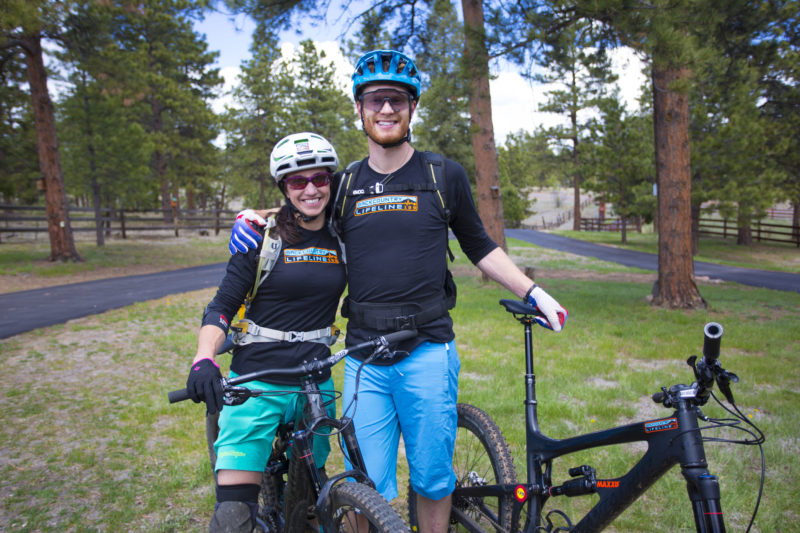
One cool thing about our merch is that everything we create, will have a “first aid” purpose as well – providing either instruction or utility. For example, our business cards have CPR instructions on the back. This was Flynn’s brainchild, and we think it’s awesome.
We are also working on a training program for INSTRUCTORS, so that more people can teach our program around the country. We hope to officially launch this program next year.
There you have it. Now its time for mountain bikers to get the training they need to help the fellow riders. It’s a responsibility to keep this community thriving and happy and enjoying a sport we love. So, sign up for a Backcountry Lifeline course, or other Wilderness First Aid training. And even if you’ve had this training in the past, it’s always good to take another course to refresh your memory and keep your knowledge current.
- Mount Buckskin (17 May 2020) - May 28, 2020
- Horseshoe Ski (14 May 2020) – The mountain whose journey nearly killed me - May 27, 2020
- Sayres X-Rated Ski (10 May 2020) - May 19, 2020
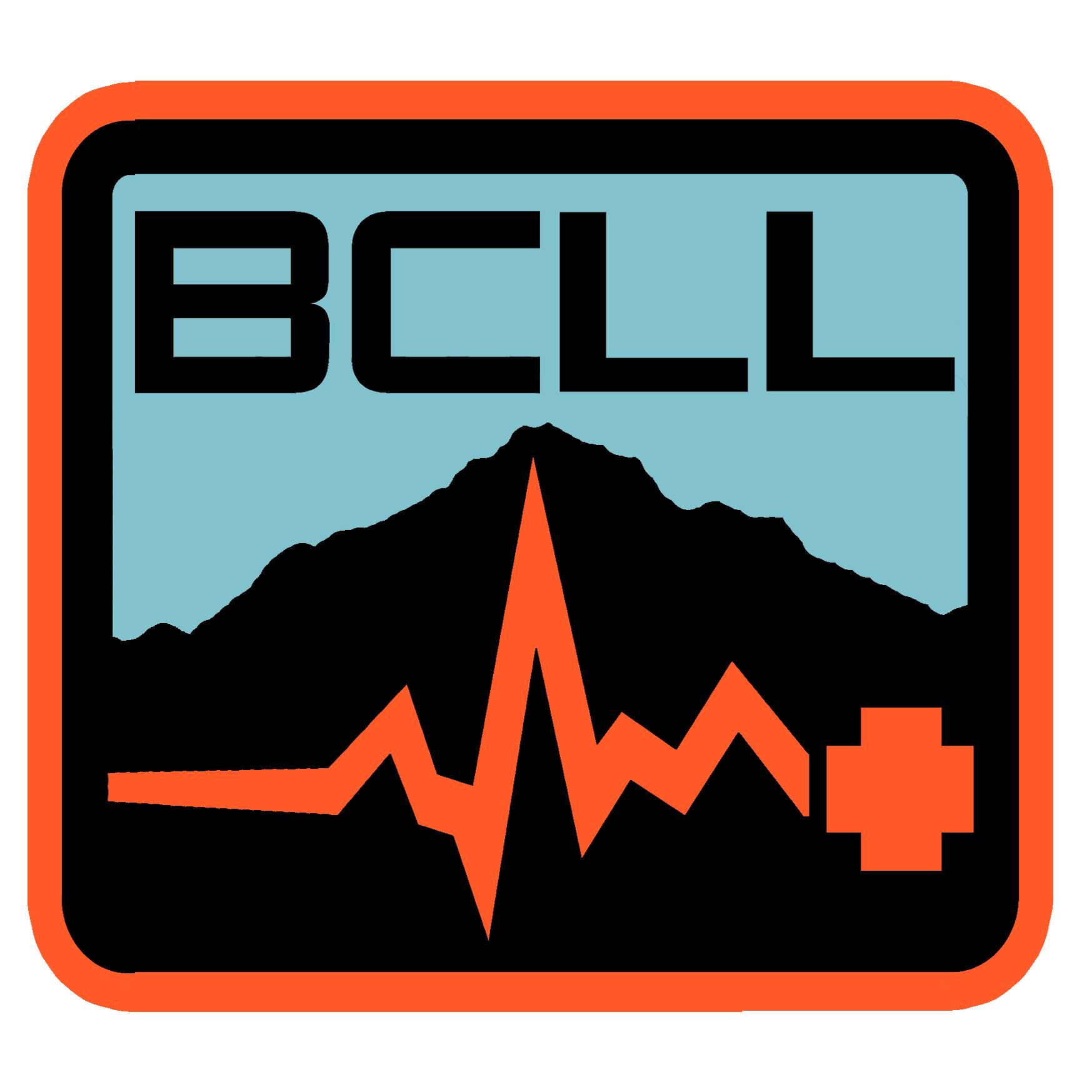

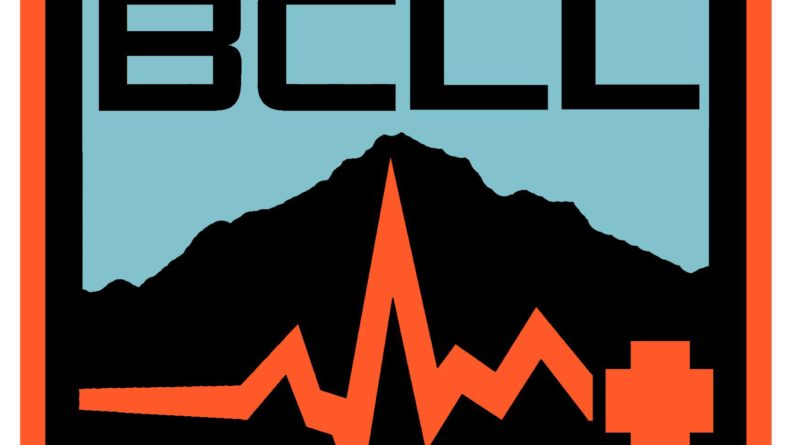
Hi Brittany – I’m not sure if you’ve covered this in a past post, but following on the heels of this one, I would be interested in knowing what you think are essential gear to take with you when you are riding in really remote country. Everything from tools for bike mtx to safety gear and anything else you think is smart to bring. Thanks!
Thanks for your comment Greg! We have not covered that in a past post, and it’s something we’ve actually been talking about ourselves. So, I think we’ll probably have a post about it soon 🙂 Thanks!
Greg, at a start, I’d say a really good multi-tool, pump, spare tube, patch kit in case of multiple flats, rain jacket no matter how good the weather looks, water purification tablets, lighter and/or waterproof matches, small headlamp (Petzl makes a tiny one that takes one of those nickle-sized batteries), some zipties, a quick-link chain, and a small first aid kit… Also, a map and/ or GPS (the free CBG Trails app works well on your phone- or better yet, Gaia) and maybe a personal locator beacon if you’re going on very remote/ less traveled trail…
PS- Drop me a line the next time you visit- happy to brainstorm in person over a coffee or beer 🙂